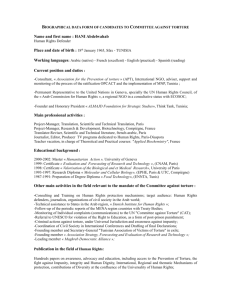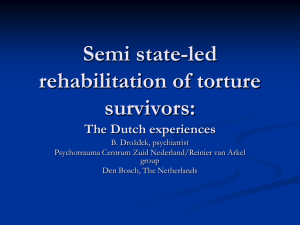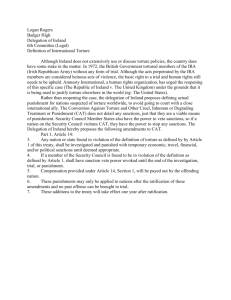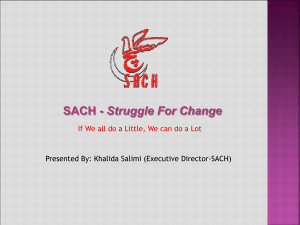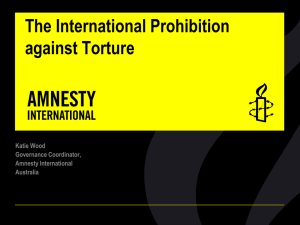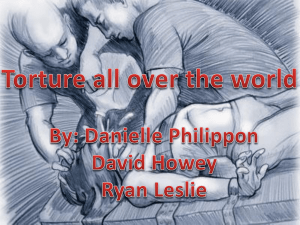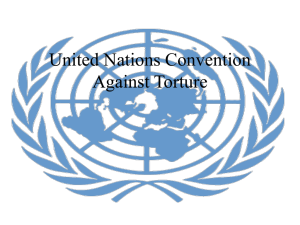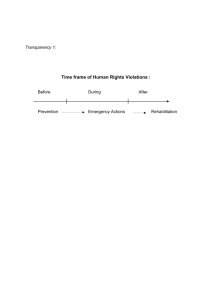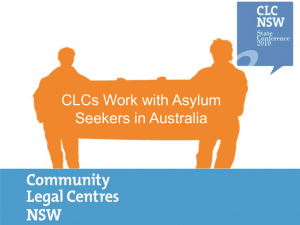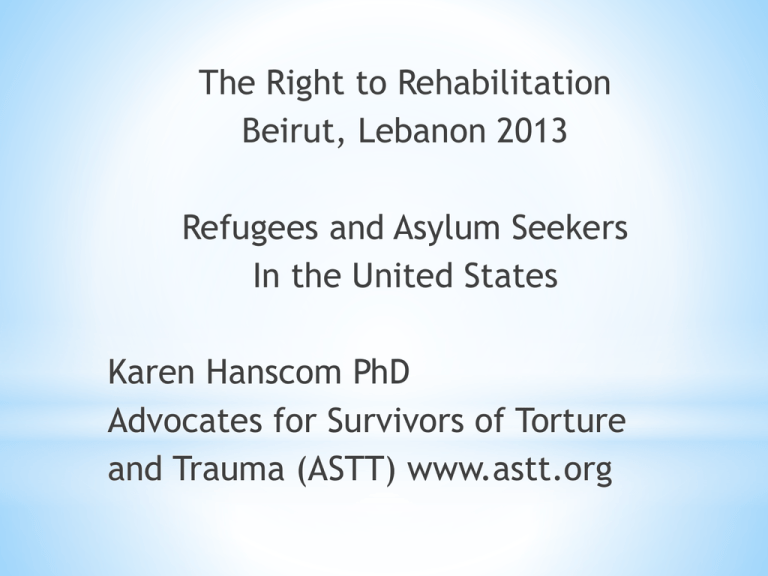
The Right to Rehabilitation
Beirut, Lebanon 2013
Refugees and Asylum Seekers
In the United States
Karen Hanscom PhD
Advocates for Survivors of Torture
and Trauma (ASTT) www.astt.org
1. Refugees & Asylum Seekers in the US
2. Refugee Benefits
3. Asylum Seekers in the US
a) Detention b) no govt. services
4. Torture Rehabilitation in the U.S.
Torture Victim Relief Act
National Consortium
5. ASTT’s Treatment Program
New Arrivals in U.S.
Top 10 countries of Origin
Bhutan (15,000)
Burma (14,000)
Cuba
Iraq
Somalia
Democratic Republic of Congo
Iran
Eritrea
Sudan
Ethiopia
1 - From outside the U.S.
2 – Special humanitarian
concern to the U.S.
3 – Demonstrate persecution
or fear of persecution
(race, religion, political
opinion, nationality,
membership in a social gr.
•Education (under 18 same free
educ. - access to Univ. as US
citizens
•Resettlement Services
(1st 3 mo. Clothes, food etc.)
•Public Assistance (Cash and
Medical Treatment
•Employment Benefits (work
authorization
After 1 year: eligible to become
permanent U.S. residents
After 5 years: can petition for
citizenship
Spouse and any unmarried minors
automatically receive refugee status
Have fled to the United States and
enter the country.
then apply for political asylum.
After granted asylum, are called
refugees
Some arrive with Visas.
Others do not.
429,000
Asylum Seeker Benefits
Torture Victim Relief Act (TVRA)
National Consortium of Torture
Treatment Programs (NCTTP)
*Capacity to Serve 5-6,000 of the
estimate 400,000 torture survivors in
the U.S.
* 34 NCTTP Members in 15
States and Washington, DC
* Of these - 24 comprehensive
torture treatment programs
*5 legal or other programs
* 1 torture survivor organization
* Torture Victim Relief Act Funds
distributed by the Office of Refugee
Resettlement
* Other Federal Funding (very limited)
* UNVFVT
* State Grants
* Foundations
* Corporations
* Individual Donations
* Case Management
Referrals: Legal, Medical, Housing,
Food, English Classes …
* Psychosocial Groups & Activities
* Psychological Treatment
Individual and Group
* Evaluations & Expert Court
Testimony
Survey of National Consortium of
Torture Treatment Programs
Therapists about the Assessment,
Diagnosis, and Treatment of the
Psychological Sequelae of Torture
Scott Vrana, Thomas Campbell & Russ Clay
Traumatology 19(2) 144-153. 2013
* 17 therapists from 10 centers
* 21 center directors
* Therapist Survey (online)
Semi-structured phone interview
Note: During the study 2 centers closed due
to lack of funding.
1) Psychological Assessment: Most
respondents used a combination of:
interview (usually non-structured);
and assessment tools - the most
common being: Hopkins Symptom
Checklist and the Harvard Trauma
Questionnaire.
2) Therapists clearly stated the
need for more resources to
conduct research to advance the
field.
3) Therapists agreed that the
psychological, social, legal,
medical and economic aspects of
a client’s functioning were
intertwined and need to be
considered together.



